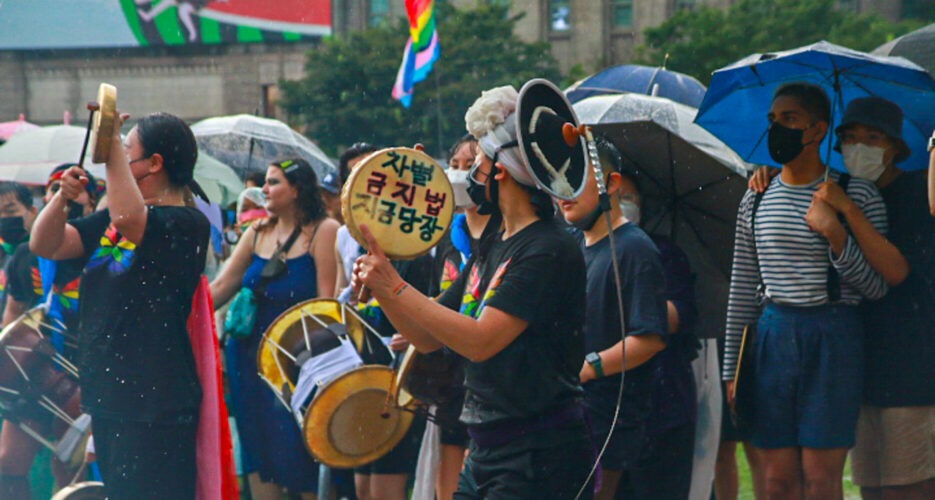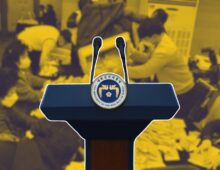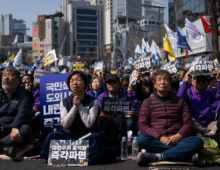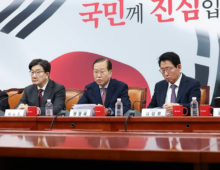|
Analysis Pride denied: Seoul’s venue rejection draws international criticismFavoring Christian event over LGBTQ festival raises questions about Korea’s belief in equality and non-discrimination Jeongmin Kim | Yeji ChungMay 17, 2023  Participants of the 2022 Seoul Queer Culture Festival marching in the streets, demanding an anti-discrimination law on July 15, 2022 | Image: Seoul Queer Culture Festival In a decision that has drawn international scrutiny, the Seoul city government has denied the Seoul Queer Culture Festival (SQCF) — the country’s largest annual LGBTQ rights event — the right to host festivities at a plaza in front of the city hall building, a location it has hosted events at for the past eight years. Instead, the city will allow the Christian Television Service (CTS), an evangelical group, to host a religious youth concert in the plaza the same day the Pride festival was scheduled. Seoul justified its decision by stating it was made by a committee of residents after the two groups scheduled events for the same time and space. The committee apparently failed to reach a compromise on the date. Many have questioned whether the decision was made impartially. Critics point to the potential for subjective interpretation in the city ordinance that Seoul used as its legal basis. Specifically, they highlight the ambiguity in determining what might constitute a more suitable event for the “public interest.” Former New Zealand diplomat Philip Turner, the first ambassador to the ROK who began his tenure with a same-sex spouse, urged the Seoul government to devise a constructive resolution. “My partner and I attended the events every year from 2018 to 2022,” Turner recalled. “We joined in the march through the city — twice in pouring rain — went on stage to address large crowds and mixed with excited local participants, most of them young.” “We were not alone,” he recalled, describing the parades as initially confronting and “even scary” to increasingly more opponents and “positive” in later years. “It is, therefore, very disappointing to hear that the organizers have been denied permission to hold the event in the plaza this year.” Echoing Turner’s sentiments, British Ambassador to the ROK Colin Crooks, who made a speech at last year’s parade, told Korea Pro that “democratic societies like Korea and the U.K. are built on the idea that all citizens are entitled to freedom of assembly and speech.” “The fact that Seoul Queer Culture Festival and the Pride parade have taken place almost every year since 2000 is an important example of those rights being exercised,” he said. Maria Castillo-Fernandez, the European Union’s ambassador to South Korea, concurred: “Diversity is to be celebrated. Diverse society is a strong society,” she told Korea Pro. “It is important that the ROK, as a global leader in so many areas, supports and is seen to support marginalized groups in society.” Musicians performing on the stage of the 2022 Seoul Queer Culture Festival on July 15, 2022 | Image: Seoul Queer Culture Festival CONTROVERSIES The “Youth Healing Concert” is set for July 1 and is a Christian music festival intended to help young adults recover from the COVID-19 pandemic, according to the organizers. CTS asserts that they held the event annually before the pandemic. In response to allegations by local media of the CTS’ potential involvement in the city’s decision-making process, the organizer told Korea Pro that their selected date was merely an attempt to “avoid rain” and the resumption of school in August. However, these circumstances have fueled skepticism among advocacy groups. According to the organizers of the Pride parade, anti-LGBTQ groups in South Korea have been working for months to prevent this year’s event. In one notable instance, just days after the SQCF submitted its plaza usage application on April 3, a Christian media outlet published an editorial urging Seoul to reject the “obscene” festival’s use of the plaza. Following this, Lee Sung-bae, a ruling People Power Party (PPP) member of the Seoul City Council, reportedly congratulated CTS for securing the location for their Christian youth concert. However, this occurred a full month before the city government made its formal decision. Lee did not respond to a request for comment from Korea Pro. The debate was further stoked by revelations of the committee meeting discussions regarding the choice of group for the plaza use. These discussions were found to be filled with homophobic remarks and presumptions about sexual orientation. One panel member was recorded expressing their opposition to homosexuality, stating: “This underground culture used to be only active in a small community in maybe Itaewon, but gradually spread throughout the city.” Itaewon is a neighborhood in central Seoul home to many immigrants and nightlife venues. The panel member continued by rejecting the event’s characterization as a festival, arguing that such a culture for sexual minorities is “educationally harmful to our children, who should receive proper education about sex and build an appropriate perception of sexual culture.” The festival organizer told Korea Pro that the decision might indicate that “proper procedures based on the city ordinance were not carried out.” The Seoul city government cited Article 6 of its ordinance on the Seoul plaza usage as justification for its decision. The ordinance stipulates that the mayor may reject plaza usage if an event is “against the objectives of [Seoul] having created the plaza.” Further, when there are multiple requests, the committee may favor one over the other. However, while the ordinance does prohibit discrimination based on gender, political ideology or religion, it also allows the city to prioritize events that serve the “public interest,” are related to “culture and art,” or those “related to children or young adults,” if there is an overlap of requests. The exact standard applied in this decision, favoring CTS over the Pride event, remains unclear. This controversy comes on the heels of a landmark ruling by the Seoul High Court in favor of a same-sex couple demanding the same spousal coverage from the state health insurance program as heterosexual couples, which Amnesty International’s annual human rights report recently noted as a major improvement in South Korea. However, despite this progress, the LGBTQ community in South Korea has voiced increasing concerns about rising homophobic sentiment since President Yoon Suk-yeol’s inauguration. Evidence of this sentiment includes the comments of Yoon’s then-presidential secretary Kim Sung-hui, who likened homosexuality to a treatable mental illness, akin to a “smoking habit.” It’s not the first time South Korea has rejected the Pride festival. In 2015, the police halted SCQF organizers from marching in the streets of Seoul and Daegu, a decision later overturned in court. A rainbow handkerchief wrapped around a participant’s wrist during the 2022 Seoul Queer Culture Festival on July 15, 2022 | Image: Seoul Queer Culture Festival THE WORLD IS WATCHING Despite Seoul’s recent promotional efforts touting a slogan of “going along with the socially neglected,” South Korea has faced global criticism for its continued discrimination against the LGBTQ community. Amnesty International, for one, expressed “concerns” on how Seoul rejected the parade from going ahead as usual. “SQCF has been one of the biggest domestic events that played an immense role in increasing visibility of the LGBTI community,” Amnesty’s Korea bureau told Korea Pro, stressing that the Seoul government “must guarantee that everyone should be able to use the Seoul plaza, without being discriminated, following the Seoul plaza-related city ordinance.” Ambassador Crooks fondly recounted his experience at last year’s festival: “Speaking at Seoul Queer Culture Festival was one of my personal highlights of my first year as British Ambassador to South Korea,” he told Korea Pro. “I’m proud to be an ally of the LGBT community here in Korea — and I’m looking forward to being involved in future events,” he said. “Everyone, everywhere, should be free to love who they love and express themselves without fear of prejudice or discrimination.” Maria Castillo-Fernandez, the European Union’s Ambassador to the ROK, underscored that “equality and non-discrimination are core values and fundamental parts of the E.U.,” one of South Korea’s key global partners. “The E.U. has participated in the Seoul Queer Cultural Festival over the years and will also participate this year,” she told Korea Pro. Castillo-Fernandez also highlighted the E.U.’s consistent support for the festival. “We will continue to express our solidarity with and support for the LGBTQ community in the Republic of Korea,” she said. “We hope there is soon a solution to be found on a proper location in Seoul.” Philip Turner, New Zealand’s former ambassador to Seoul, made a pointed remark about the importance of free expression in a democracy. “The ability to express peacefully and to tolerate different points of view is one of the key issues that distinguishes democracy, which Korea has built so successfully, from its darker alternatives,” he told Korea Pro. Furthermore, Turner suggested that Yoon Suk-yeol’s appearance at the Group of Seven summit this week might attract international attention to the city’s decision. “Other leaders will understandably want to know how the decision of his capital city not to allow a Pride event fits with his advocacy of freedom, democracy and human rights.” As the eyes of the world remain fixed on Seoul, the capital is under pressure to provide a constructive solution. Disservicing the country’s LGBTQ community appears to misalign with South Korea’s stated aspirations to become a “global pivotal state” that champions human rights and democratic norms. Edited by John Lee In a decision that has drawn international scrutiny, the Seoul city government has denied the Seoul Queer Culture Festival (SQCF) — the country’s largest annual LGBTQ rights event — the right to host festivities at a plaza in front of the city hall building, a location it has hosted events at for the past eight years. Instead, the city will allow the Christian Television Service (CTS), an evangelical group, to host a religious youth concert in the plaza the same day the Pride festival was scheduled. Get your
|
|
Analysis Pride denied: Seoul’s venue rejection draws international criticismFavoring Christian event over LGBTQ festival raises questions about Korea’s belief in equality and non-discrimination  In a decision that has drawn international scrutiny, the Seoul city government has denied the Seoul Queer Culture Festival (SQCF) — the country’s largest annual LGBTQ rights event — the right to host festivities at a plaza in front of the city hall building, a location it has hosted events at for the past eight years. Instead, the city will allow the Christian Television Service (CTS), an evangelical group, to host a religious youth concert in the plaza the same day the Pride festival was scheduled. © Korea Risk Group. All rights reserved. |













